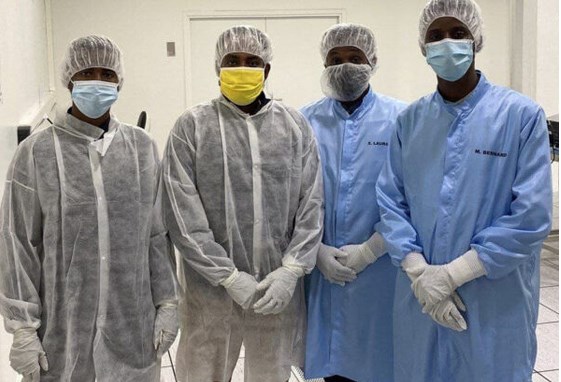Space in Africa
Saturday June 19, 2021

The African space scene is ever-increasing in both capacity and investment, and Djibouti is poised to join Ethiopia, Kenya, and other East African countries by planning the launch of two nanosatellites, Djibouti- 1A and Djibouti-1B.
The nation has also recognized the importance of human capacity building to ensure that the government is developing the country’s technological skill-set so that the trained personnel can execute future satellite projects.
Djibouti selected ten engineers to undergo training at the University Space Center of Montpellier (CSUM) in France. Their training will cover all aspects involved in the design and manufacture of satellites. This will include professional courses and hands-on training focused on the design, assembly, cabling, software, telemetry, integration, testing of space systems, and management of a ground station. The engineers are currently training with the CSUM’s Robusta 3A and Robusta 1B and will assemble the Djibouti-1A prototype in the coming months.
Furthermore, a team of students and young graduates from Djibouti and CSUM are also working on another nanosatellite project, the Djibouti-1B. The project would be funded by the Djiboutian Ministry of Higher Education and Research in conjunction with the Van Allen Foundation. The nanosatellite aims to provide the Djibouti Center for Studies and Research (CERD) with the necessary tools to keep track of the changes in water resources. CERD, created in 1979 under the Ministry of Higher Education and Research, is a public scientific and technological establishment specializing in high-level research in different fields.
The Djibouti-1B project by CSUM is one of the final six startup candidates proposing small satellite projects in a contest organized by Arianespace and Viva Technology. The competition was launched to showcase satellite projects by space technology startups, labs or universities, and it was done together with the Viva Technology 2021 innovation show. The prize for winning the contest will be a spot on a rideshare mission operated by Arianespace.
The design and development of the Djibouti-1A and Djibouti-1B will provide the requisite knowledge to ensure that the country can take charge of future projects. It is also a clear indication of the region’s willingness to bring about sustainable social and economic development by advancing its space sector.
The region’s vulnerability to the impact of climate change results in natural disasters and accelerates hardship and poverty for the country. However, Djibouti still lacks the necessary scientific and technical capacity to fully assess and monitor the possible future impacts of climate change. The Djiboutian Minister of Higher Education and Research, Nabil Mohamed Ahmed, explained during a visit to the IUT of Nîmes on October 20, 2020, that the ministry wants to invest in capacity building and the right tools to address the country’s challenges.
One of the instruments available to address environmental challenges, including climate change, and to provide early warnings of natural and human-made disasters for Africa’s development is Earth Observation satellites.
Earth observation satellites are an important tool for addressing environmental challenges and providing early warnings of natural and human-made disasters globally. With the country’s proposed launch in 2023, this will be a step in the right direction towards a dedicated space program backed by the government. With the country’s proposed launch in 2023, this will be a step in the right direction towards a dedicated space program backed by the government.